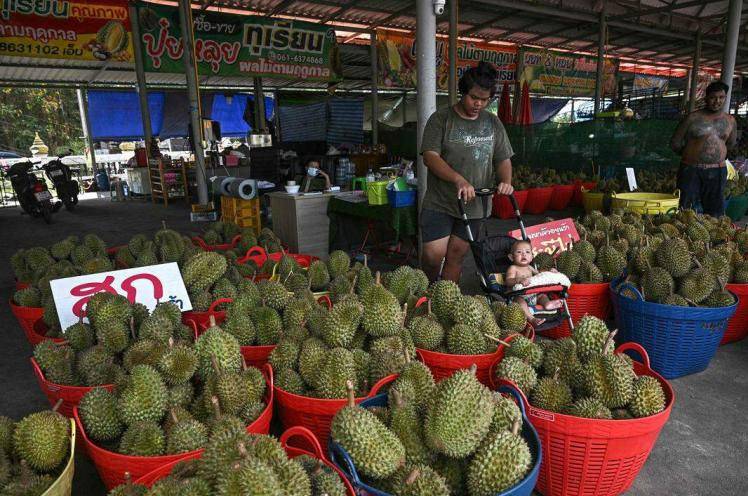
According to a report released by the Kthai Research Center in Thailand, the production of durian in Thailand has declined significantly this year due to adverse weather.
The peak season for Thai durians is usually between April and August, when about 86 percent of the annual production is produced, according to a report released Wednesday by the Kadei Research Center. Durian is mainly produced in eastern and southern Thailand, which together account for more than 95% of the country's total production. Eastern durians have been on the market since April, followed by southern durians from June. This year's production in the two regions has been affected differently by climate change.
Durian production in eastern Thailand has been affected by hot and dry weather caused by the El Nino phenomenon, China News Service reported. Especially in April, when the rainfall decreases significantly, the flowering and fruit of durian trees are affected by the lack of water, resulting in a reduction in fruit weight. Although increased rainfall from May has reduced losses during the harvest, overall, durian production in the eastern region is expected to be about 650,000 tons in 2024, down 14 percent year-on-year.
Durian production in the south has been more affected by adverse weather. Throughout the growing season, from flowering to fruiting, the southern region received less rainfall than in the same period last year. It is expected that the production of durian in southern Thailand in 2024 will be about 310,000 tons, a significant decrease of 25% year-on-year.
According to this calculation, the total output of durian in the two major producing areas in 2024 is 960,000 tons, down 18% year-on-year, which is the largest decline in 15 years.
The Kthai Research Center expects the total income of Thai durian farmers to increase by only 0.3% in 2024, as the average price of durian increased by 22% year-on-year, but the total production fell by 18% year-on-year. At the same time, the El Nino phenomenon continues, and durian farmers have to pay additional costs such as irrigation water to protect their crops against drought.

According to a report citing the Messenger Post of Papua New Guinea, a severe landslide occurred in the Wapenamanda area of Nga Province, Papua New Guinea recently, burying three houses and causing at least 11 deaths and over 20 people missing.
According to a report citing the Messenger Post of Papua Ne…
In the latest meeting minutes released by the Bank of Japan…
November 4th witnessed a "day of terror" in the cryptocurre…
On October 26th local time, Tesla's CEO Elon Musk announced…
When the US National Nuclear Security Agency fell into an "…
On November 3, 2025, Peru suddenly announced its diplomatic…